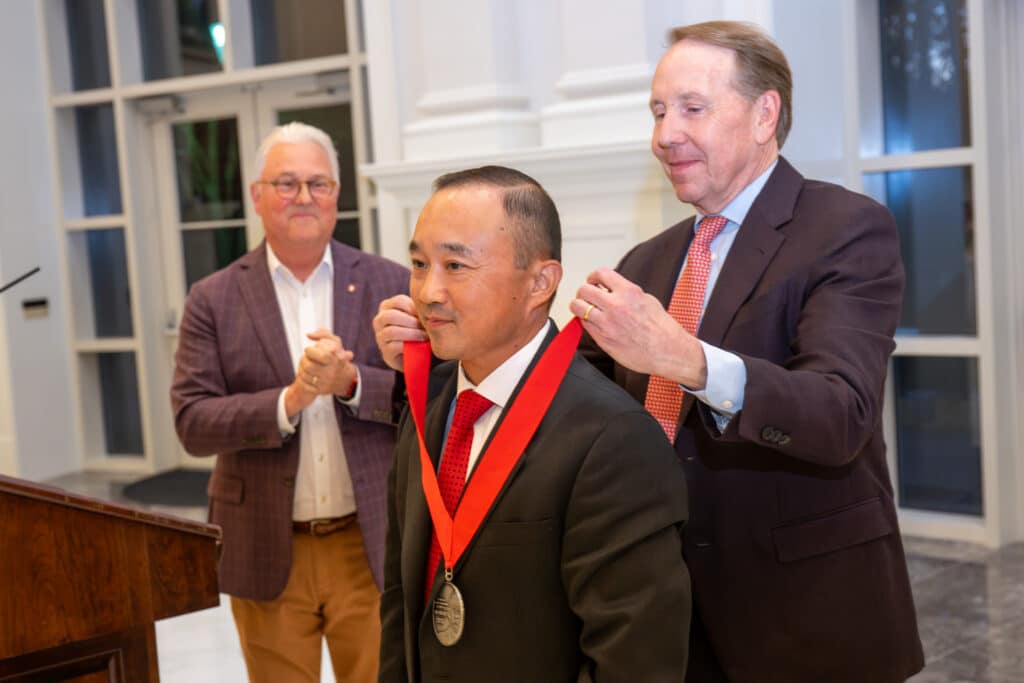Textiles Professor Wins NC State’s Top Honor
Associate Dean Xiangwu Zhang is one of three faculty members to win the 2025 Holladay Medal.

Ever since he arrived at NC State in the mid-2000s, Associate Dean Xiangwu Zhang has established himself as an innovator at the crossroads of textiles and engineering.
A material scientist by trade, Zhang spent the early years of his career focused on developing materials for lithium ion batteries.
Now, nearly two decades later, it’s proven to be a coveted skillset amid an explosion in demand for battery technology — a demand that, in many ways, has underscored the significance of his work as a researcher, faculty member and administrator at the Wilson College of Textiles.
It’s this decades-long tradition of innovative, impactful research that led NC State and its Board of Trustees to honor Zhang with its most prestigious award: the Alexander Quarles Holladay Medal for Excellence. The Holladay Medal, named after the university’s first president, is given annually to faculty members who have built a career of consistent impact and extraordinary accomplishment in research, teaching, or extension and engagement.



High demand for his research
From electric vehicles to personal electronics and a myriad of products found around houses and workplaces today, it’s safe to say battery technology has become a more integral part of our lives than at any point in history.
“Before, batteries would go to laptops and cell phones,” Zhang reflects. “But now, with the rise of electric vehicles [EVs], the market has skyrocketed. One electric car needs a battery pack equivalent to maybe 10,000 cell phones.”
And it’s not just EVs.
Today, wearable electronics, sensors and other “smart” products flood the marketplace.
Those technological advancements themselves are owed in no small part to the groundbreaking research being done on NC State’s Centennial Campus at the Wilson College of Textiles and the College of Engineering.
But they’ve also fueled demand for increasingly unique and adaptive battery technology — and, in the process, demand for Zhang’s expertise.

“How can we make a battery smaller and actually flexible?” Zhang says, describing one key problem his work aims to solve. “How can we develop batteries that are reliable and can be integrated into wearables?”
As the Wilson College’s Samuel S. Walker Distinguished Professor in Textile Innovation and associate dean for research, Zhang’s work takes many forms.
On any given day, you might find him working to discover new ways to power that wearable technology increasingly being incorporated into athletic clothing, medical garments and protective equipment.
But you also might find him collaborating with his research team on ways to improve EV battery technology — a hotly-contested research ground worldwide amid the proliferation electrically-powered cars.
“There’s a lot of competition,” Zhang says. “It’s important.”
Recently, Zhang’s decades of multi-faceted work resulted in another remarkable achievement.
Recognized as a top scholar
Widely-respected scholarly analytics platform ScholarGPS named Zhang one of its inaugural Highly Ranked Scholars. Citing his “prolific publication record,” the site recognized Zhang for his lifetime of research contributions to the fields of nanofibers and carbon nanofibers.
That distinction, the platform notes, places Zhang among the top 0.05% of all scholars worldwide.
While Zhang himself is modest about the achievement — “It’s nice to hear,” he says — his many contributions to the college, and his field, aren’t lost on colleagues.
“Besides an amazing researcher, Dr. Xiangwu Zhang is an exceptional human, educator and colleague. Even with all his work as associate dean for research, where he has helped to grow our college’s research efforts significantly, he has time for support of students and colleagues,” Emiel DenHartog, head of the Department of Textile Engineering, Chemistry and Science, says. “I am grateful for all his work and really happy to hear he has received recognition for his research.”
“Besides an amazing researcher, Dr. Xiangwu Zhang is an exceptional human, educator and colleague.”
– Professor Emiel DenHartog
Throughout his career, Zhang has likewise left an imprint on the hundreds of students he’s had the chance to mentor.
Today, at least 50 of his former students serve in prestigious professorial roles around the world.
Meanwhile, the exposure his research area offers to the high-demand intersection of textiles, battery technology and polymers has caught the eye of some prestigious employers.

“There are some students who have worked with me and later go to work at places like Apple, Amazon and many other high-tech companies that do not produce batteries but rely on them,” he says.
Back on campus, Zhang’s research team, the recipient of millions of dollars in government and industry research funding through his tenure, also recently marked its own achievement: its 300th peer-reviewed publication — work focused on innovations in the EV battery space.
For him, it’s fulfilling work that’s sure to keep him, and his team, busy for years to come — accolades aside.
“It’s not because I wanted to get recognition that I work so hard,” Zhang says. “It’s because I work hard that I got it.”
- Categories:


